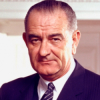Lyndon B. Johnson

Lyndon B. Johnson
Lyndon Baines Johnson, often referred to as LBJ, was the 36th President of the United States from 1963 to 1969, assuming the office after serving as the 37th Vice President of the United States under President John F. Kennedy, from 1961 to 1963. Johnson was a Democrat from Texas, who served as a United States Representative from 1937 to 1949 and as a United States Senator from 1949 to 1961. He spent six years as Senate Majority Leader, two as...
NationalityAmerican
ProfessionUS President
Date of Birth27 August 1908
CountryUnited States of America
In Asia we face an ambitious and aggressive China, but we have the will and we have the strength to help our Asian friends resist that ambition. Sometimes our folks get a little impatient. Sometimes they rattle their rockets some, and they bluff about their bombs. But we are not about to send American boys 9 or 10,000 miles away from home to do what Asian boys ought to be doing for themselves.
In our home there was always prayer - aloud, proud and unapologetic.
We are not about to send American boys 9 or 10 thousand miles away from home to do what Asian boys ought to be doing for themselves.
Four. That's what I want you to remember. If you don't get your idea across in the first four minutes, you won't do it. Four sentences to a paragraph. Four letters to a word. The most important words in the English language all have four letters. Home. Love. Food. Land. Peace. . .I know peace has five letters, but any damn fool knows it should have four.
This generation has altered the composition of the atmosphere on a global scale through radioactive materials and a steady increase in carbon dioxide from the burning of fossil fuels. Entire regional airsheds, crop plant environments, and river basins are heavy with noxious materials. Motor vehicles and home heating plants, municipal dumps and factories continually hurl pollutants into the air we breathe. Each day almost 50,000 tons of unpleasant, and sometimes poisonous, sulfur dioxide are added to the atmosphere, and our automobiles produce almost 300,000 tons of other pollutants.
I report to you that our country is challenged at home and abroad: that it is our will that is being tried and not our strength; our sense of purpose and not our ability to achieve a better America.
I know - from personal experience - that abiding values and abundant visions are learned in the homes of our people.
A President must call on many persons--some to man the ramparts and to watch the far away, distant posts; others to lead us in science, medicine, education and social progress here at home.
This Civil Rights Act is a challenge to all of us to go to work in our communities and our states, in our homes and in our hearts, to eliminate the last vestiges of injustice in our beloved country. So tonight I urge every public official, every religious leader, every business and professional man, every working man, every housewife - I urge every American - to join in this effort to bring justice and hope to all our people, and to bring peace to our land.
We preach the virtues of democracy abroad. We must practice its duties here at home. Voting is the first duty of democracy.
It is very seldom that any one is in prison for an ordinary crime unless early in life he entered a path that almost invariably led to the prison gate. Most of the inmates are the children of the poor. In many instances they are either orphans or half-orphans; their homes were the streets and byways of big cities, and their paths naturally and inevitably took them to their final fate.
I hope your mind's not as empty as that desk
Boys, I may not know much, but I know chicken shit from chicken salad.
There's so much that we have yet to do -- the hunger in the world, the sickness in the world, the poverty in the world. We must apply some of the great talents that we've applied to space to all these problems, and get them done, and get them done in the spirit of what's the greatest good for the greatest number.